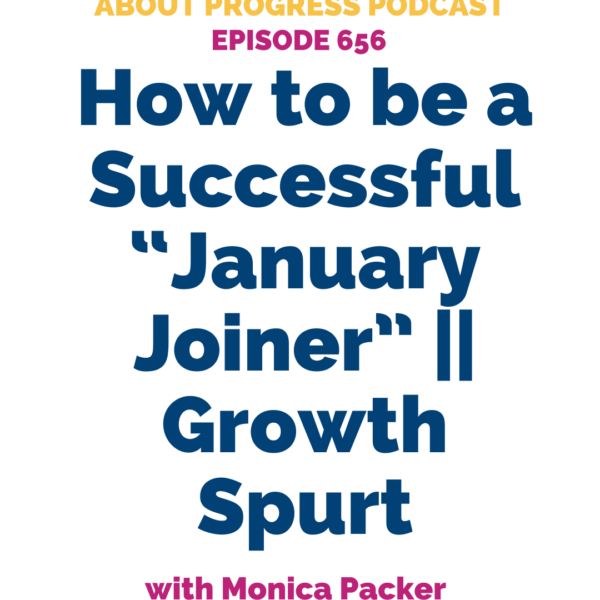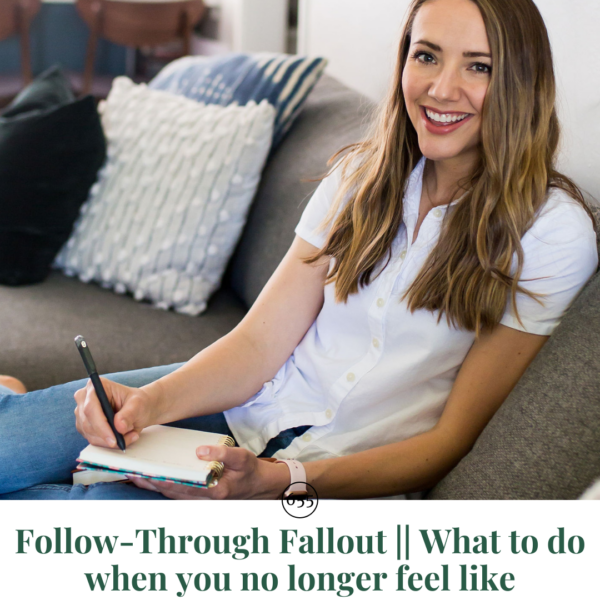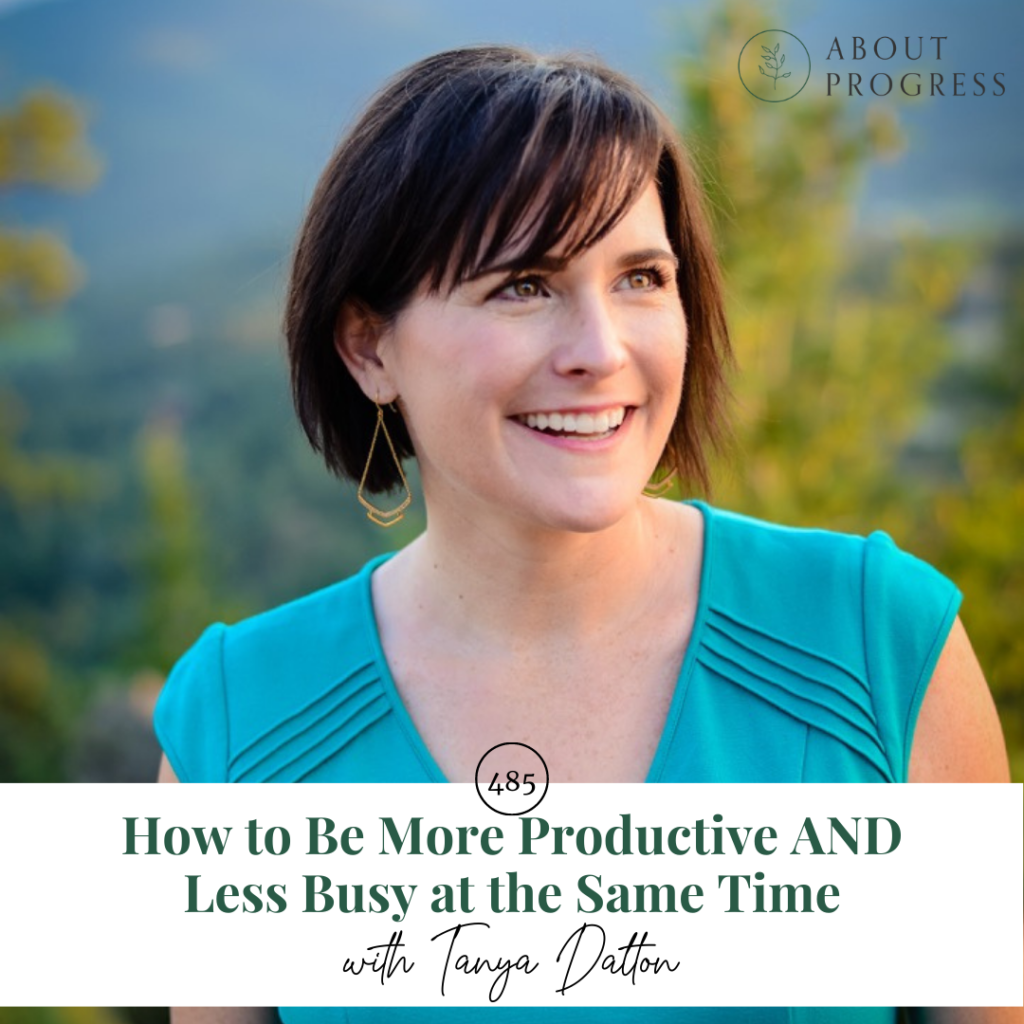
It is so easy to get caught up in the busyness of our day-to-day lives, whether it’s a productive kind of busy, or not. But, what if there was a way to continue being productive, without the overwhelming feeling of being so busy? Tanya Dalton of inkWELL Press is a productivity expert who is all about boosting your productivity in ways that are lasting (and DOABLE!).
In this episode you’ll learn about priorities, where to start when you feel overwhelmed, the benefits of a brain dump, how to take breaks when you need them, and how to make intentional choices with your time. If your to-do list is getting in the way of you living a real life, if it’s draining you instead of fulfilling you, then it’s time to do something different. Try the simple swap that Tanya explains in this episode and take back control of your time in a way that works for you, not against you.
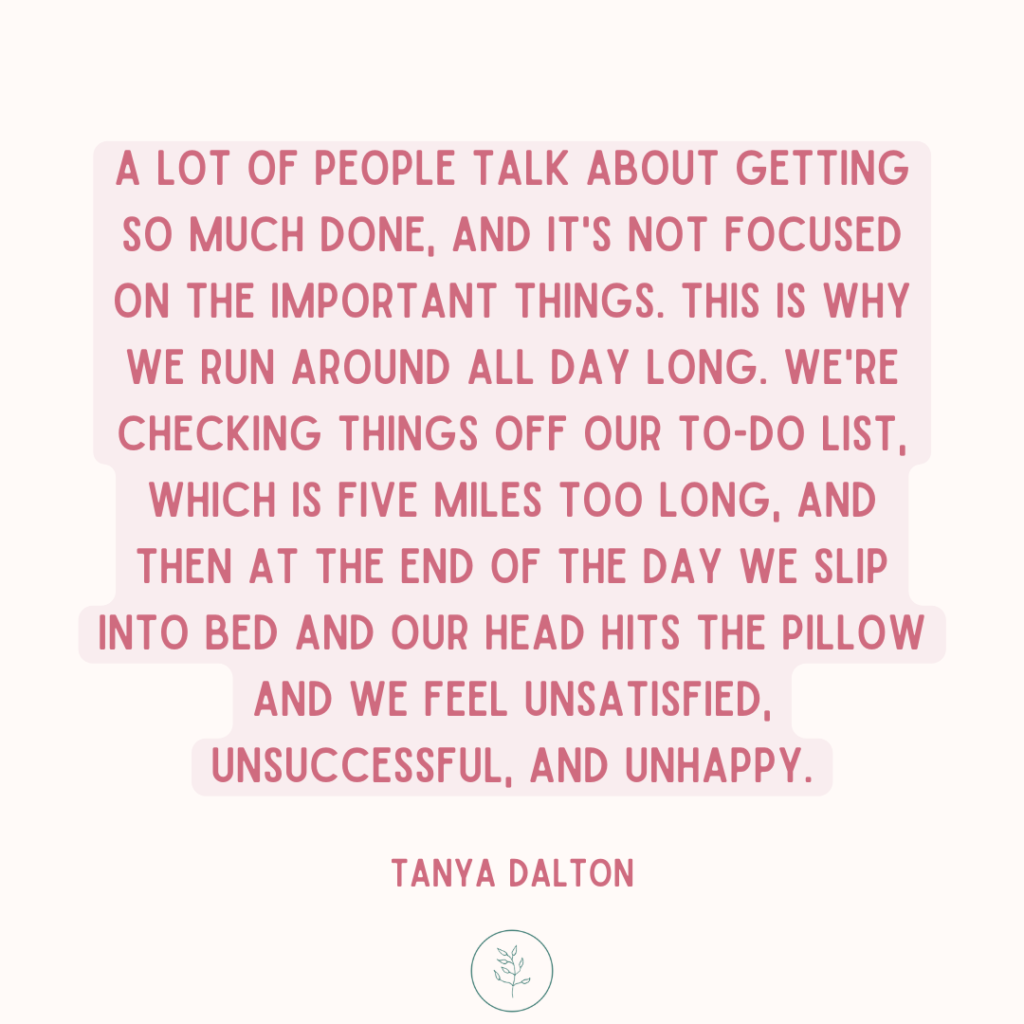
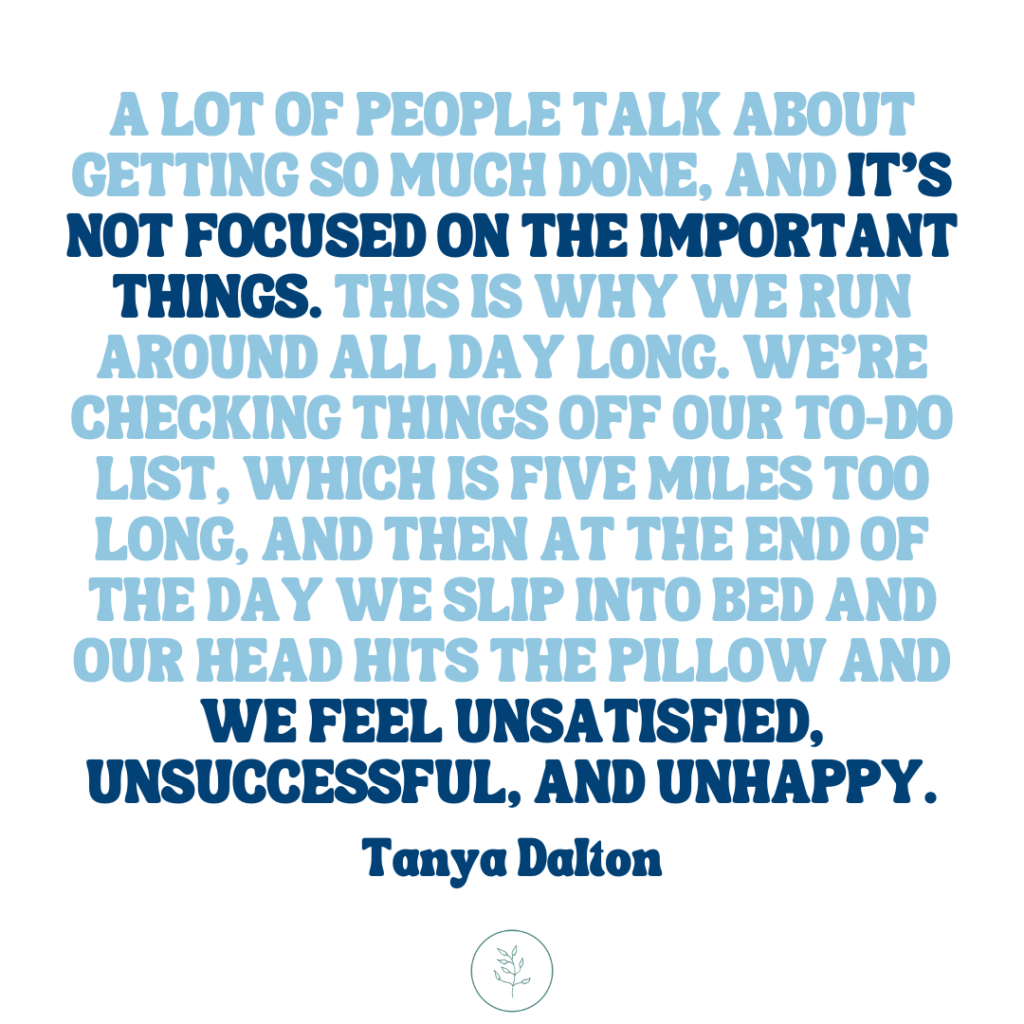
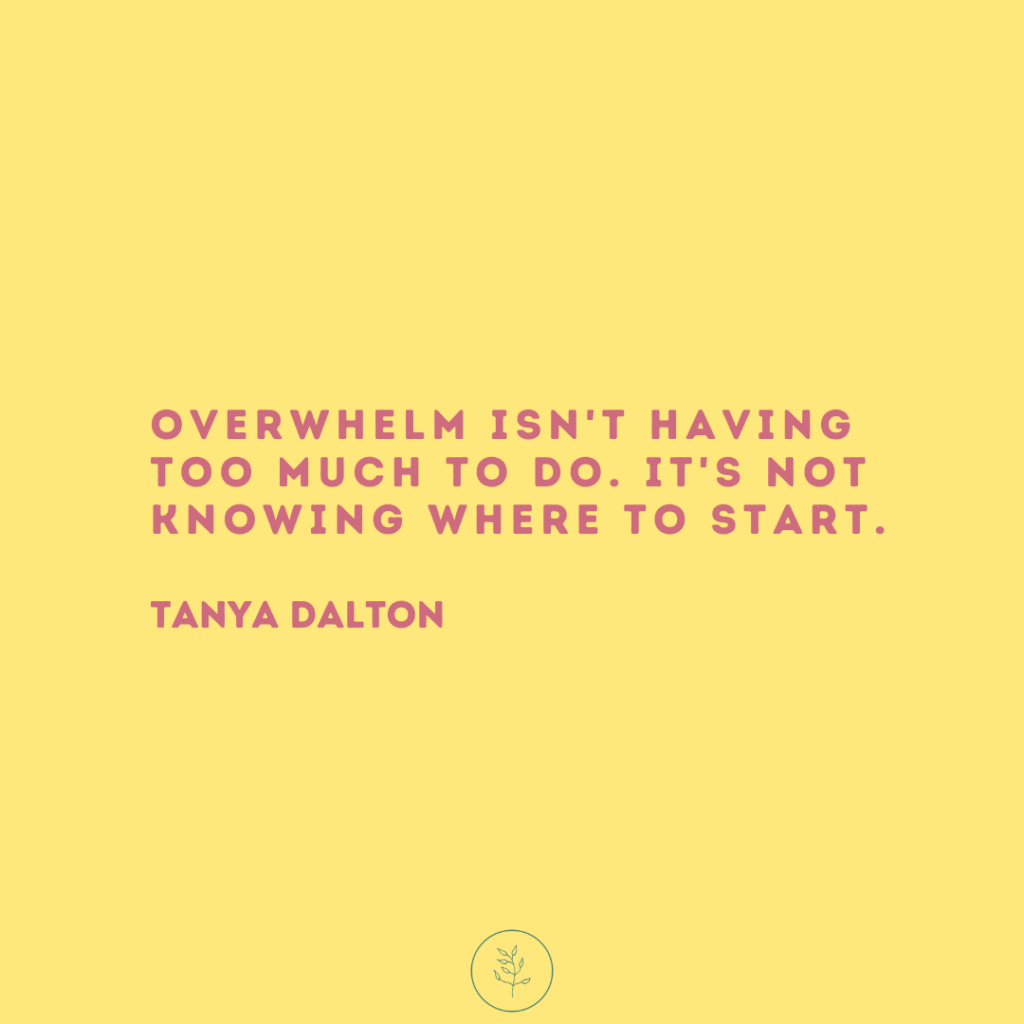
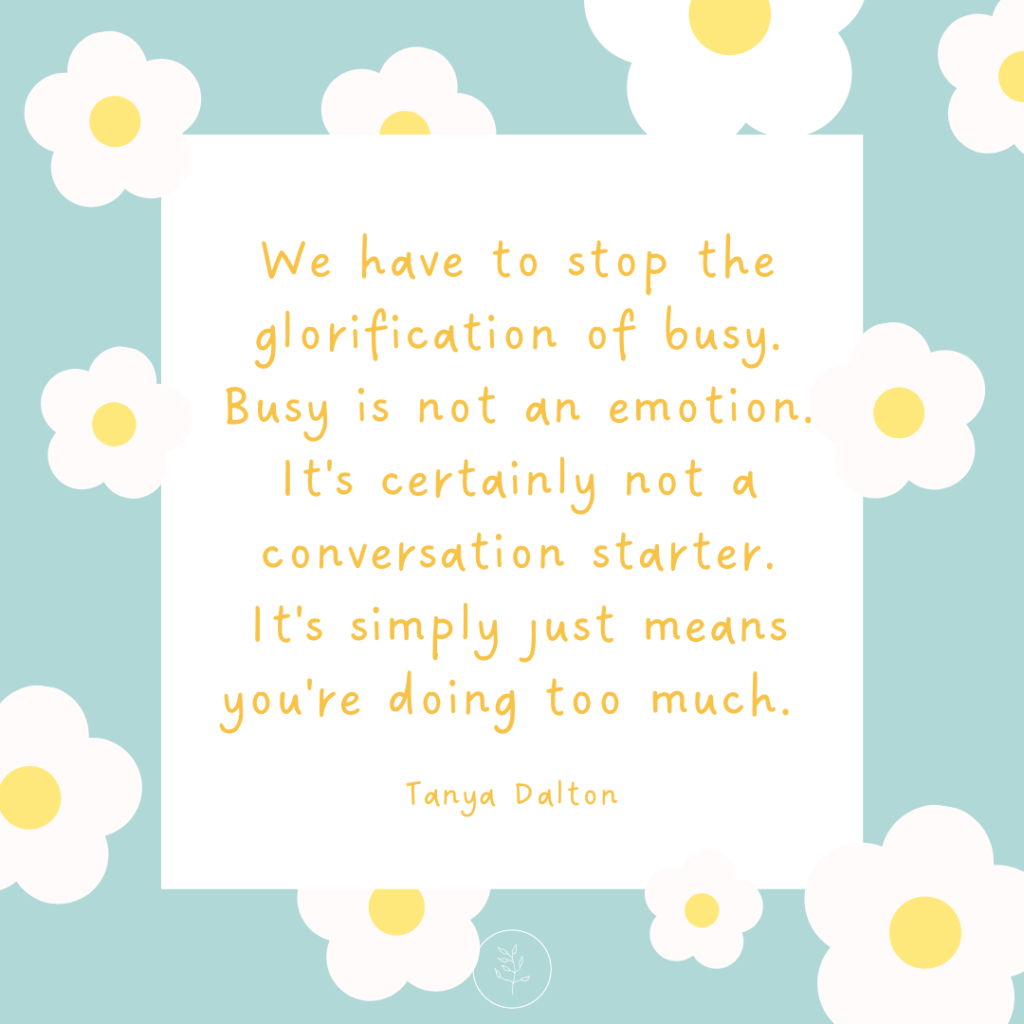
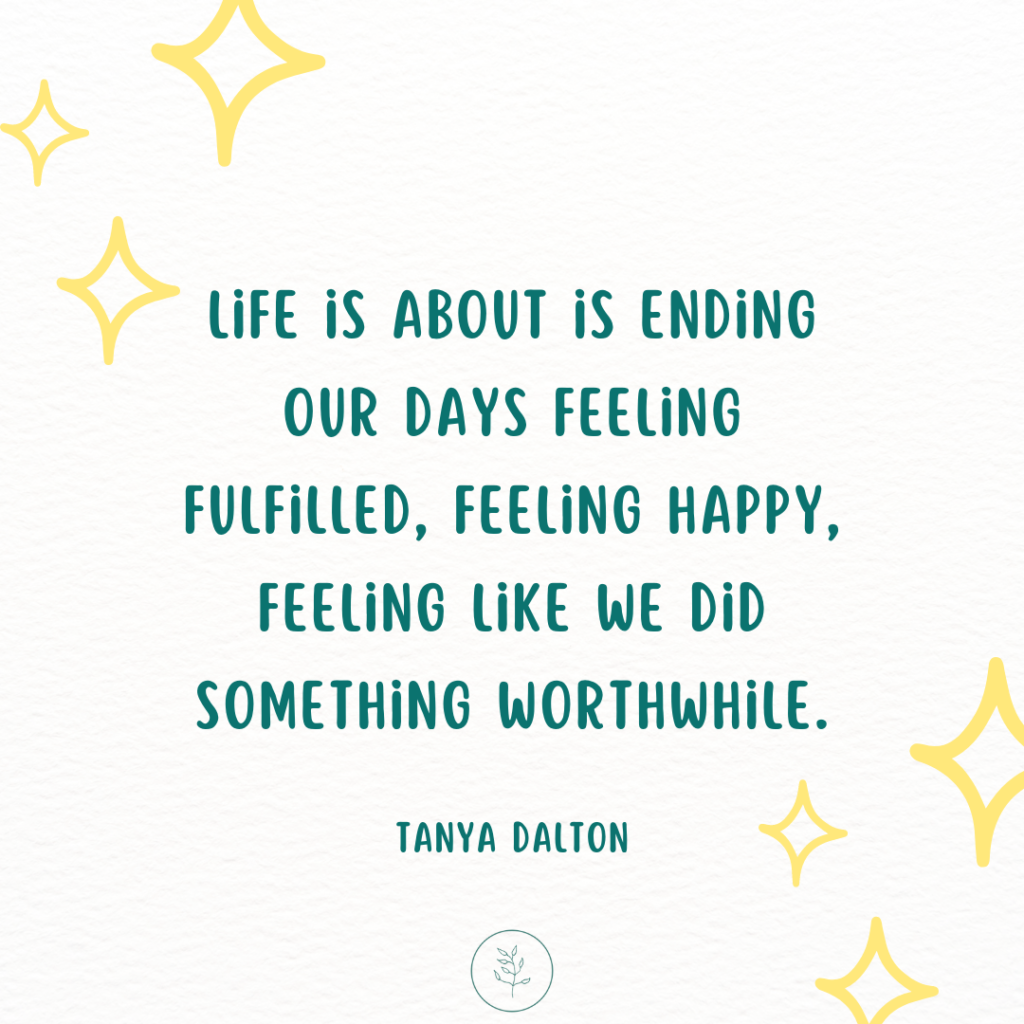
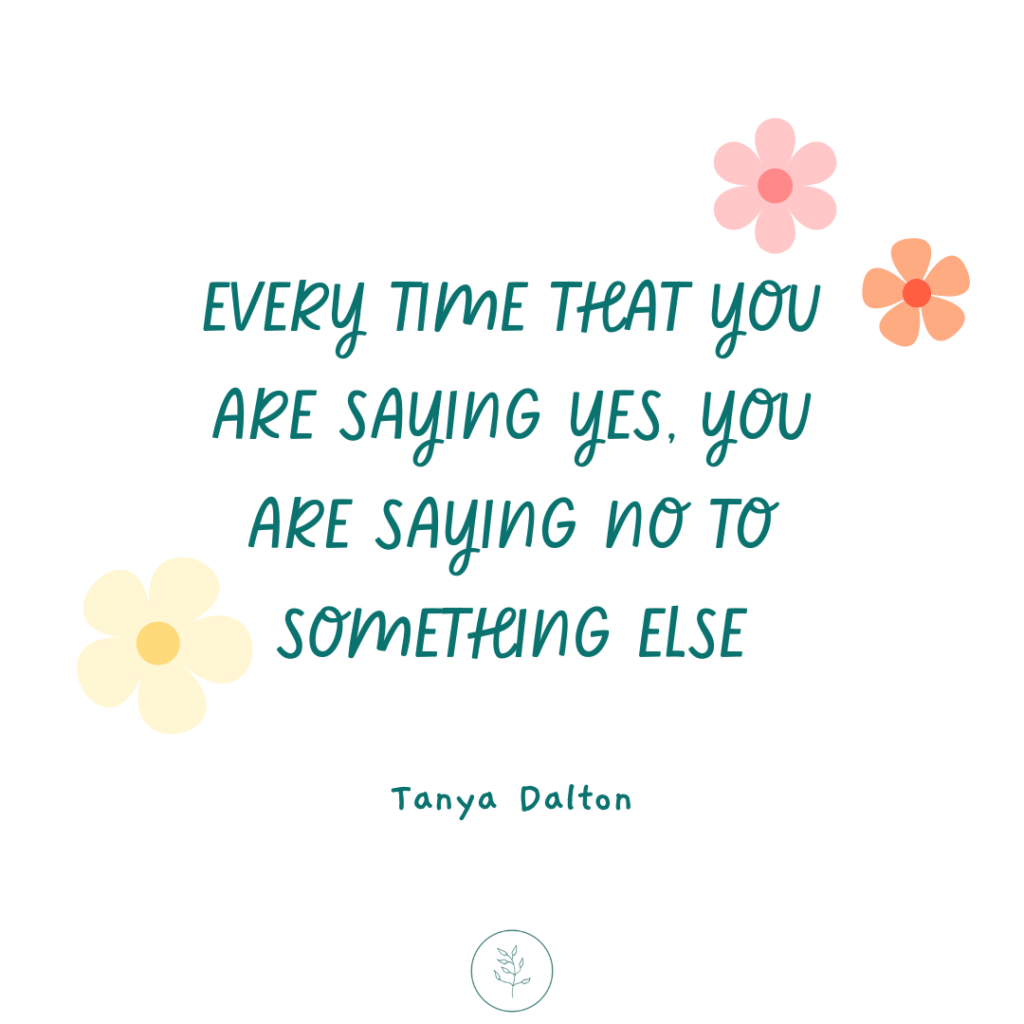
About a few other things…
Do you struggle to create habits that stick? It’s not your fault. The truth is simple: you’ve been trying to form habits using methods designed for perfect robots–not real women living real lives. It’s time to change that. If I could help you gain confidence in creating habits AND guide you to uncover the ONE supportive habit to deeply care for yourself, could you commit 21 days to learning this method? The Sticky Habit Method is a 21-day course that revolutionizes the habit-formation process. It’s real habits for real women.
Sign up for the Go Getter Newsletter to get Progress Pointers in your inbox every Tuesday.
You can listen the episode below, or on Apple Podcasts/iTunes, Spotify, Youtube, Overcast, Stitcher, Pocketcasts, or search for “About Progress” wherever you get your podcasts. If you like the show please share it, subscribe, and leave a review!!
SHOW NOTES
inkWELL’s website, Instagram, and Tanya’s Podcast
Finding Me Academy
DSL Guide
Try me FREE Class and check out my NEW Habit Course
Leave a rating and review for the podcast!
Lend your voice and experience + be featured on the show HERE
Join Monica on Facebook and Instagram
Songs Credit: Pleasant Pictures Music Club
TRANSCRIPT
Monica: Hi Tanya. Hi, how are you? I’m doing great. How, how about we start with you giving our listeners an intro?
Tanya: Absolutely.
So my name is Tanya and I am the owner of inkwell Press. So we are a productivity focused company and we really focus on helping women understand what they think is really most important because to US, productivity is not about doing more.
It’s not about running around and, and getting into the hustle or the idea of being busy. It’s not piling more on your plate. It really is the idea of doing what matters most. So you’ll hear me talk a lot about things that you might not hear from other productivity experts. Things like, you know, intention, being mindful.
We’ll talk about cultivating happiness and things like that because to me it really is about living the best life. It’s about living the life that you really want to. Not worrying about what everybody else is doing, focusing on what’s truly most important to you.
Monica: So you’re not about, let’s make you as busy as possible.
It’s about let’s make you as prioritized as possible. So what, what does, what’s the difference then you think, between that and maybe what other people are trying to preach?
Tanya: Well, I think that’s a good question because a lot of times people are talking about things like, you know, let’s say, you know, how do, how to do 10 podcast episodes in a day, or how to answer 50 emails in an hour or how to, and it’s important to be able to streamline your systems and it’s, it’s important to be able to really make things run smoothly at the same time.
I really think it’s important to ask yourself, is that really what I want? Is that what I think really fulfills me or fulfills the mission of what I think I wanna do. So to me, priority is what drives everything. What are the things that are most important to you? Now, the things that are most important to you are different than what they are for your best friend or your mother, or your boss, or you know, all the, they’re your neighbor.
And so it really is about figuring out what that means to you. And I think what a lot of people do is they talk about getting so much done, and it’s not focused on the important things. And this is why we run around all day long. We’re busy all day long, getting things done. We’re checking things off our to-do list, which is five miles too long, and then at the end of the day we slip into bed and our head hits the pillow and we feel unsatisfied, unsuccessful, and unhappy. We think, why didn’t I get more done? Or, I didn’t do enough. And it’s funny because you think I was busy all day long, but why do I feel like I didn’t get enough done? And usually it’s because you’re not really doing the things that are important, the things that are moving you towards the path that you really want to be on.
And I think that’s the difference. One is running around getting a lot of things done. The other one is moving forward in one direction, the direction that you really wanna go towards.
Monica: So we need to chat a little bit more and, and to how to prioritize, how to better do that so that you are actually meaningfully productive instead of just busy.
One of my big pet peeves, if I’m gonna be mean right now is when everybody says, I, you know, how you doing? Oh, I’m so busy. Oh. Mm-hmm. One of my things is we are all busy. I don’t think I know one person who was not busy. And I think we over praise that trait or we think it’s a good thing. And like you said, busyness can just be a form of being unproductive in the end.
And it can also be a form of procrastination too. And I think that the way this translates is how it feels is the emotion of feeling overwhelmed. So let’s talk about what that might look like and how what that really is, is it’s masking a deeper problem, what you think that could be too. So talk to me about the feeling overwhelm and how that relates to what we’ve been chatting about.
Tanya: Yes, absolutely. And I have to agree with you. I think we have to stop the glorification of busy. Amen. We have to stop answering that question of what, how are you with, I’m busy because busy is not an emotion. It’s certainly not a conversation starter. It’s simply just means you’re doing too much. Right.
But we use that as a badge of pride. It shows that we have, oh, I’m busy, I’m, I must be doing a lot. And I think, to be honest with you, that feeds into this being overwhelmed. I, I find that when I speak to women, no matter where they are in life or what they’re doing, whether they’re a stay-at-home mom or they’re doing a side business, or they’re full-time at a career, or they’re, you know, running their own business fully, I say to you, I say to them, you know, well, how do you feel about how things are running?
And I hear the word overwhelmed again and again. Yeah, so I think this is, this is a thing that so many women have in common and I like to tell people that overwhelm isn’t having too much to do. It’s not knowing where to start because our list is so long because we have so many things that we’re trying to do, we don’t know where to begin, and we sit there and we, we think we’re doing what we wanna do, but we’re not really beginning where we want to begin, and we’re not starting on the tasks that we really want to do to more move us.
Monica: So is it, is it that people aren’t taking the time? Well, I’m sure a lot of people are writing lists, so it’s not about writing lists, although sometimes people totally don’t. A lot of times I’m just flying by the seat of my pants and doing what’s right in front of me instead of what is most purposeful.
So maybe a list is a good place to start, but yeah. What were you gonna say? Well, I’ll
Tanya: be honest. Yeah. Yeah. I, I don’t believe in the to-do list. Okay. And I think that’s the biggest problem is most people think I’m making a to-do list, so surely I’m productive. Right. Surely, I, I have an idea of what I need to get done, but to-do list honestly don’t work.
And so I tell people, toss the to-do list because really what you need to do is write a priority list. Oh, okay. Okay. The reason why a do list doesn’t work is because usually, as I mentioned, it’s really long, right? We just keep tacking things on throughout the day. One more thing, one more thing, one more thing, or, you know, it’s just a, an unorganized list.
We just put things in there willy-nilly as we think about them, and I think a brain dump is a great way to start. But a brain dump on a to-do list don’t really work as your list of what you wanna get accomplished each day. What I tell people to do is write a priority list. And the beauty of a priority list is it tells you exactly where to start.
It takes the exact same amount of time as making a to-do list, but it really gives you that path of what you wanna do. And so I’d be happy to walk you through that a little bit if you’d like. Yeah, let’s hear it. Okay, so the priority system that I use and that I talk about has three different levels.
We have immediate, important, and insignificant. So the key thing here is looking at each task that you wanna get done in the day and asking yourself, is it important? And when something is important, it means it pushes you closer to your goals. It pushes you closer to your mission or your vision of where you wanna be.
And you ask yourself if it’s urgent or non-urgent because here’s the problem, a lot of times people think whenever something is urgent, it’s also important, but there are two very different things. Urgent only refers to time, but what happens is we have these urgent fires that crop up and we think I have to take care of that right now because it’s screaming out at you.
Right? So you think I have to tackle that first? Even when it’s not important. So that’s really the indicators for the different levels. So at the very top of your list is your immediate category. And so these are things that are important and urgent. So they drive you towards your goals. They’re things that help you move towards the things you really are wanting to do in life.
But they also have a really tight deadline coming up, right? So maybe it’s like a project that you’re working. For your business that’s due tomorrow, or you know, things like that. Then the second level is important. So these are items that are important but not really urgent. They don’t necessarily have a tight deadline, you know, and to be honest with you, this is where you really wanna spend the majority of your time because this is the area where you’re growing and you’re able to really look forward and be proactive. So these are areas where you’re doing things like, you know, taking a course or sitting down and creating a budget for your family, or it’s things that are helping you plan ahead so that these things don’t become urgent fires, right? So if you take the time to really focus on things that are important but not really urgent, they don’t ever end up becoming urgent items.
So those are, that’s the area that’s most important. So we have the immediate. Then we have important and then we have insignificant. And that’s the very bottom of your list. And those are items that are unimportant, but they’re urgent. Usually these are things that are tied to things that other people want or other people’s priorities, other people’s projects volunteer opportunities that you really didn’t wanna do, but now you’re obligated to do.
Right? Things like that. Things that really aren’t tied to your personal mission statement or your personal goals, but they have an urgent deadline, so they’re screaming out at you to get done. And many times we end up taking care of these things first, even though they’re not important, we simply do it because it’s urgent.
Right. Can you give an example
Monica: of that? Yeah. What, what’s example of something that. That is on that part of the list,
Tanya: just so I can understand. Well, I was, yeah, I would say so. For any sort of like work drama that you’re having to deal with, I would say, you know many times we end up getting roped into a committee that we really don’t wanna do, but then it has a deadline attached to it.
A lot, the majority of your emails in your inbox, you know, we stop and we check email all the time, but I promise you right now, 80% of your emails that are in there, Are not important. Most of them are other people’s fires, right? A lot of times it’s things like your phone calls that you’re getting, so things that aren’t really tied to moving you forward towards your goals.
But because there’s something like an email, you feel like you have to respond to them right away. Mm-hmm. Does that make
Monica: sense? Yes.
So what do you, how then do you prioritize your time based off of this list of what is most important in the end? But I mean, what if you’re in the middle of something that is important, but then you get that, that urgent call from, from someone in your life?
I mean, cuz a lot of women listening are working and others are not too. So it, it can be anything there, but. How, what do you do? I mean, do you just like reject the call?
Tanya: Well, no, cuz if it’s important then it should be closer to the top of your list. The things that are at the bottom of the list are the things that are unimportant.
Okay. So, and that’s the beauty of the priority list is that really you’re starting at the top with the things that are urgent. And important, and that is where you start your day. That is where you spend your time in the morning focusing on those things. Absolutely. Then you go down your list. Right. So you take, you’re taking care of those things that are urgent and important right away.
Mm-hmm. The things that are urgent but not important. Those fires that really are not important, that some other kind of. That gets done at the end of your day. Actually saying yes to the things that are important and you’re saying no to the things that are unimportant.
Great. Here, here’s the thing that I think people lose sight of every time that you are saying yes. You’re saying no to something else. So when you’re saying yes to these unimportant things, you’re saying no to the things that are important, time spent with your family you know, your own goals, your hobbies, your passions, those types of things.
So we often say yes so easily because it’s so easy to say yes cuz it feels good and it, we don’t feel guilty about it, right? Mm-hmm. We feel okay. But every time we’re saying yes, we’re saying no to something else. So we really wanna be saying yes to the important things and saying no to those unimportant things.
And that’s why they’re at the bottom of our list.
Monica: So what would you say to a woman who is listening and they just feel like everything on their list is important or immediate, you know? Mm-hmm. Like, they’re just like, everything is urgent and it pushes me towards who I want to be. Mm-hmm. How can we get away from that kind of thinking, or how can we pick that apart and really figure out where the lines are?
Tanya: I think that’s one of the biggest issues that a lot of women face is they feel like everything is important. Mm-hmm. And here’s the thing, if you treat everything as a priority, then nothing is okay. Right. If you think about it, if you treat everything the same, then nothing is elevated. Nothing is important.
If you’re treating things that are really important to your family, the same as things that are like with a stranger, that’s not really accurate, right? So within your priorities, you have priorities.
Monica: Do you think they’re just trying to delay prioritizing their life in general?
Like maybe it’s hard to know what’s prior in priority list. On your priority list because you do yourself, don’t know what your end goal is in mind or what you really are working toward.
Tanya: I think that’s a really good point. I think a lot of times we’re not stopping to take advantage of thinking ahead of where is it we wanna go.
So it really is taking the time to sit down, set some goals for yourself, what do I want to get done this week or this month or this year? What are the things that I really want to do that are important to me? And oftentimes the things that are really important are tied to those. Right, because the goals are putting you forward to the path you’re wanting to be on.
So if you have questions about whether something is important or not, I would challenge you to say, you know, is that tied to a goal? Is it tied to your mission of who you think you want to be? And I would ask yourself some questions like that. Or is it simply urgent? Is it simply a fire that is screaming out at you and so you’re choosing to take care of that?
That’s the question we have to ask
Monica: ourselves. You know, and I think that this, like we’ve been talking about, it does apply to whether you’re working or you’re working in the home, as you know, a stay at home mom. Mm-hmm. I think even us stay-at-home moms, we need to figure out what our mission is. Yes. And have that nailed down too.
Mm-hmm. Because we can, and we should otherwise, like you said, absolutely. We’re gonna be setting, we’re gonna be putting out fires all day that are taking the time away from what really matters most. So yes. What do you say about those women in mind?
Tanya: Yes. Well, you know, I used to be a stay-at-home mom myself, and so I understand staying at home with your kids is a job.
And I think the thing, the mistake that a lot of stay-at-home moms make is they think I don’t have a job or, so I don’t have a need to, to make a mission statement or I don’t need to think about my vision statement, or I don’t need to worry about setting goals. And here’s what I would challenge you.
I would challenge you to think about your family as a nonprofit company because that’s essentially what you are, you’re basically working for no profit. You’re not getting paid, and the product you’re creating are children who are ethically and morally the way that you want them to be, correct?
And you’re wanting to have a house that runs in the way that fits your family’s belief system. And so what I tell women who are stay-at-home moms is you are the c e o of the home. Whether you realize it or not, you are the c e o and you are running the show there and you need to treat it just like you would a nonprofit.
So you have to think of yourself. Cause I feel like that’s one of the things stay-at-home moms do is they say, oh, I don’t do that. I don’t do that much because I, I I don’t get paid. Or they belittle because they don’t get paid. Just because you don’t get paid does not mean what you are doing is not worthwhile.
As a matter of fact, it is one of the most beneficial jobs to our society. You know, women who who stay at home and take care of their children are, are, are very important. And so we need to make sure that we’re really looking at ourselves for an accurate lens. We tend to allow that inner critic in our heads. To to make us feel smaller than we are.
So I would really encourage yourself to start calling yourself the CEO of your home instead of just a stay-at-home Mom,
Monica: Tanya. This is exactly what I’ve been talking to woman about in person. I mean, I talked to one earlier this week. She used to be a teacher and she’s been struggling with feelingimportant. Mm-hmm. She kept saying, you know, I just need to view what I’m doing with my children. Like, I know it’s important, but I need to view it important and as important. And I said, yes, no. What you need to do though is view yourself as inherently important. Mm-hmm. Regardless of what your quote, unquote job is and, and, and by extension of that, that heightens what you actually are doing. The, the value that is in what you are doing, whether that’s staying home with children mm-hmm. Or working for a big business or creating your own. If you value yourself and prioritize your own goals and your own progress by anything you do, by extension is going to be more important.
Absolutely. So I love what you’re preaching there. Absolutely. Thank you. What if, what if this is though a, a woman who’s at work mm-hmm. How can she get away with doing, with doing just what is most urgent in her boss’s mind or her colleagues’ minds? How is she able to still progress towards her own mission statement and not get swept up in that of her companies?
Tanya: I like that question because I think that’s really true. You wanna make sure you’re focusing on what is most important. So what I usually tell people is if your boss or your manager is giving you a lot of work or your coworkers, I would ask them, can you tell me where this needs to go in my priority list?
And I would explain to them what happens a lot of times is, You know, I’m a boss and I manage people, and I’ll give my employees tasks and then I’ll forget that, oh, I just gave them a task two days ago and I gave ’em a task two days before that. Right? So what you need to do is you need to go to your manager or your boss, or whoever it is, and say, okay, I love that you’ve assigned me this project.
However, I have all these other things you’ve assigned me. Can you tell me where this ranks in my priorities? What do I need to let go of in order to do my best work? Because I wanna make sure I’m doing the best work I can for you. Where do you think my time needs to be spent and put it back on them.
Many times your manager or your boss doesn’t realize all of the things that you’re doing and they go, oh my gosh. Totally forgot that cuz they’re wrapped up in their own world, right? I totally forgot that I gave you that other large project two days before because it’s off their plate and they’re not thinking about it.
There are ways that you can go back and you can say this in a really nice way. It doesn’t have to be snarky or ugly or anything like that. I like to use, you know, anytime I’m doing something like this, I like to use what I call the sandwich technique. So the sandwich technique is basically the outside pieces of your bread are saying something nice and then the inside, the meat of what you wanna say is really what you wanna say.
So in this example, you would say something like, I love that you trust me to take on this big project. This looks really exciting. Then you’re gonna slip into the thing. All right. But I’m not exactly sure where this fits on my priority list. I already have several things you’ve assigned me, so I’d love to know where this goes.
And then you follow up with your other piece of bread where you say, I really wanna make sure I’m doing my best work because I really enjoy working for you. Or something like that
Monica: and
Tanya: that goes far with anybody, trust me.
Mm-hmm. Anyone who sees that you are working to try to create the best work you can for them, they appreciate that. Mm-hmm. At least if they’re, you know, a halfway decent manager or boss. Right. And I think this is true not just, you know, at work, but if you have a spouse or a friend or a relative who is constantly dog piling items on you, it’s the same way of thinking.
You know, what, what do you think I should be taking off my plate that pertains to you that will allow me to do this? How do, how do you think I need to prioritize these tasks that you have given me? And put it back on them? Because I’ll be honest, as a manager of people, sometimes I need to tell them, listen, I’ve assigned you this.
Take this off your plate. This is a higher priority item. So really opening up that conversation allows. Allows you to understand what they perceive to be the most important, right? And that actually helps you climb that ladder a little bit faster because managers love it when you’re working on the projects that they believe is most important,
Monica: and that kind of forces them to narrow down.
What is their mission and their overall goal, instead of just putting out fires all day, that’s gonna benefit everyone. Mm-hmm. Let me ask about, you know, you talked about being mindful as you are prioritizing, and when you’re doing those today, day-to-day things that you have to do or want to do or it’s going to serve you the most.
I think there also needs to be some differentiation between what is needful and what is fulfilling. Like some days you do need to put everything on your immediate list to just important and work on going on a walk or finding a way to fulfill yourself so that you’re able to get back to what those important and then immediate items are.
How does that come into play with prioritizing?
Tanya: Well, to be honest with you, building breaks into your day is so important. So if you are going out and you’re thinking, I need to just muscle through, I don’t care if I’m tired, I don’t care if I’ve, I’ve got too many things to do, I can’t stop and take a break, then you’re actually working against your body because your body is designed with this this system called the ultradian rhythm.
It’s basically a rhythm in your body where you have these peaks and valleys, this flow of energy that goes through your body. And you’ll notice at the beginning of an ultradian rhythm, you have a lot more energy. You’re maybe excited about a task, and after about 90 to 120 minutes, your energy level starts to dip and it starts to drop. Now there’s no way to get rid of these valleys, and we don’t really want to, it’s kind of like, you know, running a marathon, you can’t go and run a marathon at a full sprint. You have to have periods where you’re running slower and right. You have to pace yourself. So during these valleys, that’s when you should be taking your breaks.
And so I really think it’s important to really specifically schedule in your breaks to make sure that you’re doing them. That might. Going for a walk. It might be drawing for 15 minutes. It might be reading a chapter in your book. What it is not is it is not checking email. That is not a break. Right?
That’s more work. It’s not going to meet with somebody at a meeting. It’s, it’s honestly finding something that you enjoy and creating a little bit of white space for yourself because white space is so important for us to be able to take that deep breath. And inhale before we go back to our work. So I think that that’s really important and people need to make sure that they’re including that in their day.
It’s not something that should be viewed as frivolous or extra. Breaks are really important to being able to do your very best work.
Monica: Beautiful. What I love about that process is that you’re making it purposeful. I think too often when we don’t give ourselves permission to take breaks, what we find ourselves doing, if you’re really thinking about it, looking back on our days, we are taking breaks all day.
Doing numbing behavior. Like scrolling through Instagram? Yes. Or doing the email, like doing things that are giving us a break from what’s most I. But aren’t really, they’re not really fulfilling us because we’re not doing it purposefully. And so, I mean mm-hmm. Not that Instagram is bad. I think if you decide I’m going to take a 15 minute break and scroll through Instagram, that will be way more fulfilling than accidentally.
Yes. Taking a 10 minute break on Instagram. That kind of thing is something that I’ve been trying to work on. And I love that you are saying that needs to happen. Those breaks have to
Tanya: be, I mean, honestly, your body requires it, and you’re right though, we don’t wanna do these numbing activities. We wanna do something very intentionally and very mindfully, because then let’s say maybe it is going on Instagram because you enjoy that, then it is you going in there and truly enjoying it and then not feeling guilty afterwards because it was an intentional choice, right?
Because often we’re, we’re just mindlessly scrolling through social media and then we finish, and then we beat. We give ourselves a nice little lecture beating ourselves up for doing. Right? Yes. And then we feel guilty about it. So to me it really is. What, how do you feel after you’ve scrolled Instagram?
Do you feel better or do you not? If you don’t feel better, then don’t use that as your break. If it is something that feels good and is fulfilling to you, do that. So figure out the things that you really do want to do. A lot of women say, you know, I really wish I had time to read. If you added up all the.
Number of times that you’re picking up your phone and checking email or scrolling through social media mindlessly, you have time to read a chapter every day. You have time to read at least half a chapter, right? So it really is about taking these little pockets of time, creating these breaks that are very, very intentional and really focused on what you really want to do.
And that is when you end your day feeling, oh gosh, you know what? I did pretty good today. And that’s what life is about is ending our days feeling fulfilled, feeling happy, feeling like we did something worthwhile. And I think that’s what’s really most important here.
Monica: And I think the difference too is I have a lot of former perfectionists on my show, listening up for my show or people who are still perfectionists.
I think the difference. There is prioritizing gives you permission to not check off everything on your list each day, and thereby feel more fulfilled with what you have accomplished because you know it’s serving you better in the long run. And it gives you also permission to be human, to take those breaks, to not finish everything, to go to bed at a reasonable hour and get leave things undone.
Tanya: It’s very true. I am a recovering perfectionist myself. Yeah. I say recovering because you’re never quite over it. Yes. It’s something that I still struggle with. And you have to really, again, that word mindful, you have to be mindful of because it can be so debilitating because you end up mm-hmm.
Nitpicking the teeniest, tiniest things over and over again, trying to make them. Perfect. And we really have to walk away from that idea and really understand, is this something that is truly important to me or am I just maybe caught up in a story that I’m telling myself that a good woman always does this, A good mom always does this, or a good wife never does that.
We tell ourselves these stories and we tie them into our perfectionism. A good mother always has fresh, fresh, you know, baked goods when their kids get off the school. Where does this, is this even true? You, we need to ask ourselves those things. Yeah. Is this really a true statement or am I building myself up to a place that I really can’t reach this I’m, we’re setting ourselves up for failure from the get-go many times.
Monica: Wow, Tanya, that’s all given me a lot of aha moments. They’re, you know, let’s tell people, people might want to start on this. Where do you recommend they start? And then I’d also like you to tie in what your service are, services are, and where they can find you too.
Tanya: Yes. Well, I would love for people to start really thinking about those to-do lists and really start prioritizing and marking things on their list of what is really important to them.
I would challenge you to look at your to-do list from yesterday or the day before and look on there and think. Were, were these things? What, what on this list was important and what was not, and what did I get accomplished? And that will really help give you that springboard to want to prioritize. I talk a lot about prioritizing on my podcast and also on my video series.
So each week we dive into a topic. We do a theme each season. So this season right now that we’re in is turning stumbling blocks into starting blocks. And so we’re talking about things like procrastination. Like perfectionism, like, you know, overthinking and analysis paralysis, and we talk about how you turn those around and make them into a springboard.
So we, each week we cover a topic on the podcast, and then I also have a video on YouTube where we dive a little bit deeper into that topic as well. So that’s a great place to start getting a little bit of information about how I talk about productivity and how you can begin to. Focused. So I have that.
I also have a Facebook group where we talk all things productivity and being mindful and intentional. And then I also do sell products that go along with my, my feelings on productivity. So we have planners, we have weekly planners, daily planners we have meal planners. And really they’re designed so that you can focus on what is truly most important.
So, you know, we were talking about that goal. You know, part of, you know, how important that is, whether you’re a stay-at-home mom or, or someone in a job or, or an entrepreneur. And then that is very tied into our planner. So we, we have a, a goal setting feature in there. So you’re really focused on that with habit trackers to help you keep on track.
My mission behind what I do is to help women feel empowered in living their best life and really that. Going after your big goals and dreams. How about you tell us
Monica: the name of your website address, where people can find all of these resource?
Tanya: Absolutely. So it’s inkwellpress.com and everything that I talked about here, the podcast, the YouTube, the Facebook group, all of those things you can find by going to inkwellpress.com.
Well, I’ll
Monica: definitely check you out there. And this has been lovely. I like to ask my guests a final question, and it’s a little bit more personal than, than we’ve been talking right now. It’s what have you learned about yourself the past few years?
Tanya: Oh, I like that question. You know, as a recovering perfectionist, I’ve learned that I need to give myself more grace and that I need to feel okay with what I’ve gotten done each day, and that it’s honestly this idea of it’s not about doing more, it’s about doing what’s.
It’s most important is a concept that has really hit home to me. And I really think that that’s been one of the biggest light bulb moments in the past few years for myself. So it has allowed me to grow my business while really focusing on my family.
Monica: And that’s the key. I mean, that’s what we all want in the end.
We all, I’ll make sure I link to what all the services, resources, and products that you talked about here on our show. When people can find those on my website about progress.com. And thank you so much for being on the show, Tanya.
Tanya: Well, thank you so much for having me.
